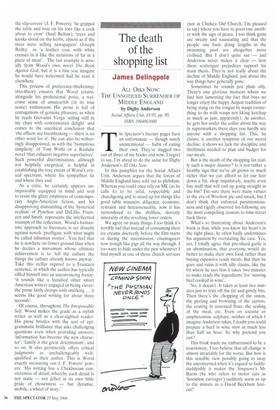Taking matters seriously
Stephen Abell
THE IRRESPONSIBLE SELF: ON LAUGHTER AND THE NOVEL by James Wood Cape, £16.99, pp. 312, ISBN 0224064509 For a critic as seriously intelligent as James Wood, a discussion about the nature of comedy is, inevitably, no laughing matter. And this is appropriate enough: modern comedy, in his opinion, appears to contain few actual laughs. The historical shift from an essentially religious, theatrical 'comedy of correction' to a secular, novelistic `comedy of forgiveness' — the move from piety to pity — has instead brought with it a much fuller range of emotional intricacies. As a result, all comic novels are problem comedies, of 'hilarious pathos' or 'mingled amusement and pity': Wood is talking un-laughter and the novel.
Wood's view of comedy is closely related to his view of literature itself. He is immensely, and convincingly, sympathetic to an ideal of writing embodied by what Keats called 'negative capability': 'when a man is capable of being in uncertainties, mysteries, doubts, without any irritable reaching after fact and reason'. What Wood considers vital is an author's fidelity to the irreducible difficulties of existence, a 'deliberate opacity, the drawing of a veil, a willingness to let obscurity go free'. It is the standard requirement for a Woodapproved novelist, like Chekhov or Tolstoy, or the Norwegian Knut Hamsun who aims for 'characters in which their very lack of consistency is their basic characteristic', or the other predominantly European authors so definitively praised in The Irresponsible Self.
Indeed, one comes to reflect over the course of this collection that the great close readers are, in an important sense, closed readers. It is Wood's own theoretical consistency — his 'tying his ear only to his own tongue', as it were — that allows him profitably to trace similar qualities in otherwise dissimilar writers. So he is repeatedly drawn to, say, a definite type of honestly realistic writing, what might be called the non-epic simile ('poetic, but also the kinds of observations the characters themselves might have used'): 'overstuffed furniture rising like bread beneath
the slip-covers' (J. F, Powers); 'he gripped the table and rose on his toes like a cock about to crow' (Saul Bellow); 'trees and kiosks stood on the kerbs, almost as if the trees were selling newspapers' (Joseph Roth); or 'a leather coat, with white creases in it like the striations of fat in a piece of meat'. The last example is actually from Wood's own novel The Book Against God, but it is a line you imagine he would have welcomed had he read it elsewhere.
This process of preference-thickeninginto-theory ensures that Wood retains, alongside his professional poise, a welcome sense of amateurish (in its true sense) enthusiasm, His prose is full of corrugations of genuine pleasure, as when he reads Giovanni Verga 'sitting stiff in my chair with concentrated delight' and comes to the uncritical conclusion that 'the effects are breathtaking — there is no other word for it'. He can also be witheringly disappointed, as with the 'bumptious simplicity' of Tom Wolfe or a Rushdie novel 'that exhausts negative superlatives'. Such powerful discrimination, although not helpfully exegetical, is helpful in establishing the true extent of Wood's critical spectrum, where his sympathies lie and where they end.
As a critic, he certainly appears unimprovably equipped in mind and soul to resist the glitzy emptiness of contemporary Anglo-American fiction, and his disapproving dismantling of the 'hysterical realism' of Pynchon and DeLillo, Frantzen and Smith, represents the intellectual triumph of the collection. Wood's humanistic approach to literature is set directly against novels 'profligate with what might be called inhuman stories'. You feel that he is nowhere on firmer ground than when he decries a movement whose ultimate achievement is to 'tell the culture the things the culture already knows anyway'. Take this stellar reproof to a Frantzen sentence, in which the author has typically riffed himself into an unconvincing frenzy: 'it sounds like a hundred other smart American writers engaged in being clever:
the prose fairly droops with smirking it seems like good writing for about three seconds'.
Of course, throughout The Irresponsible Self, Wood makes the grade as a stylish writer as well as a clear-sighted reader. His prose bristles with the sort of epigrammatic brilliance that asks challenging questions even when providing answers: 'information has become the new character', 'family is the great determinism', and so on. It also persistently offers critical judgments as unchallengeably wellqualified as their author. This is Wood exactly measuring out J. F. Powers' powers: 'His writing has a Chekhovian concreteness of detail, whereby each detail is not static — not jelled in its own little pride of chosenness — but dynamic, mobile, a wheel of story.'



































































 Previous page
Previous page